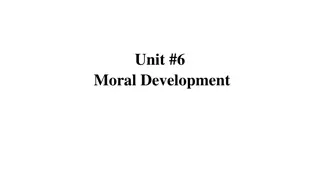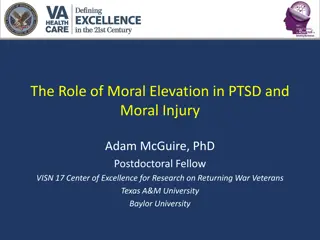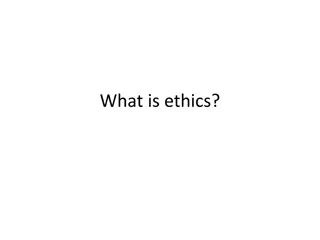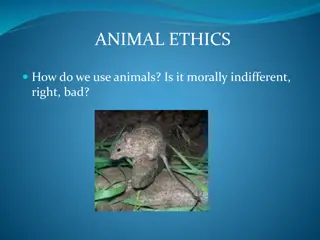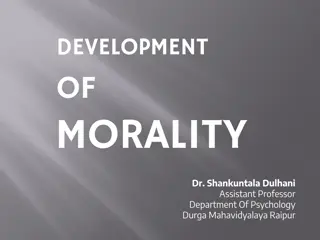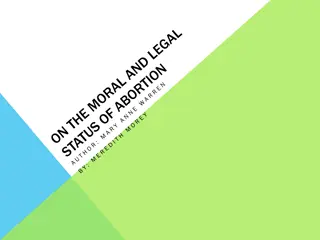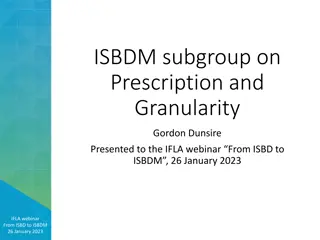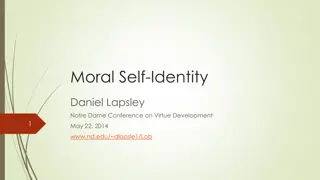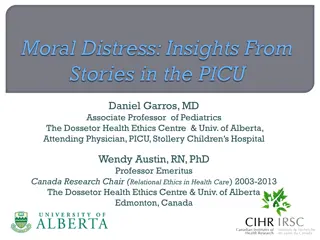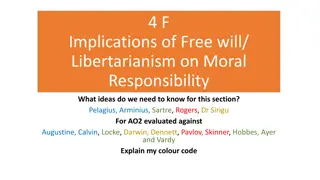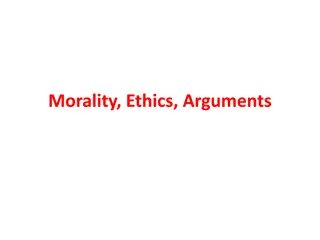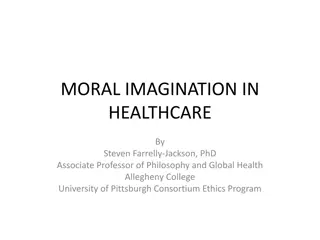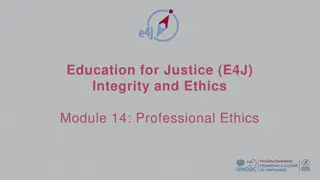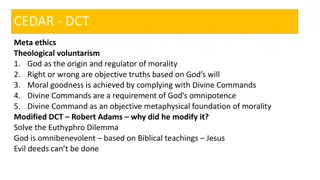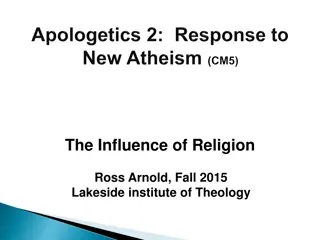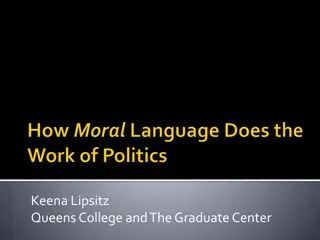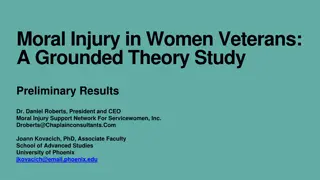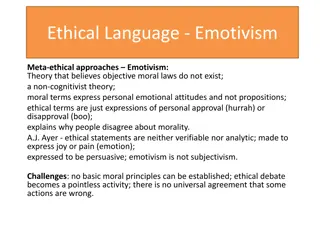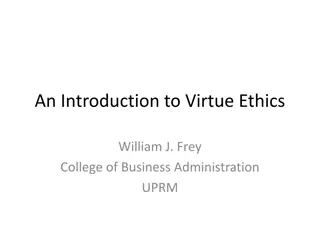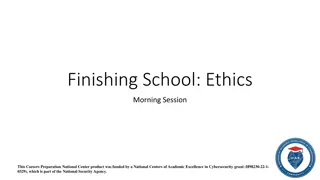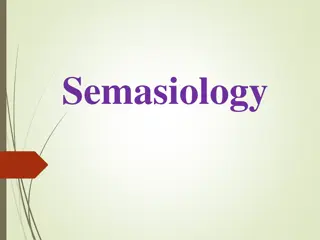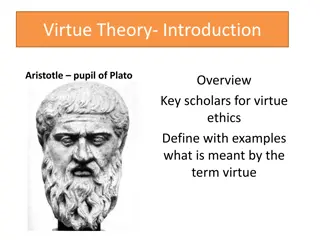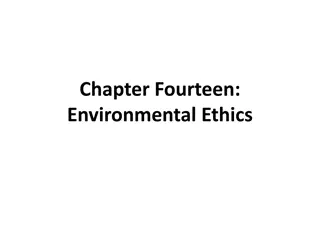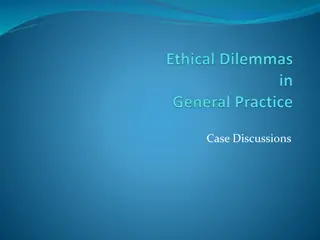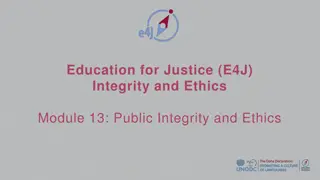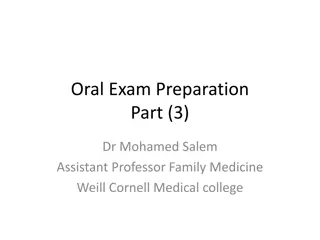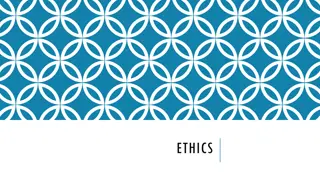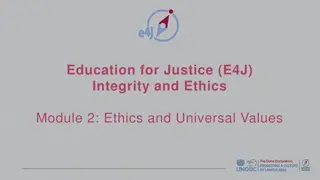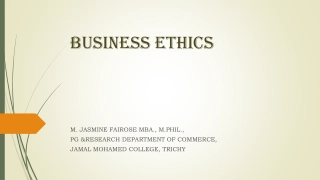Exploring Moral Judgments and Prescriptive Meaning in Ethics
This content delves into non-cognitivism, Hare’s prescriptivism, and moral anti-realism to understand what we do when making moral judgments. It discusses prescriptive meaning, the concept of good, and how moral language guides actions. The objections raised regarding moral language's functions, particularly focusing on prescription as a central element, are also examined.
Download Presentation

Please find below an Image/Link to download the presentation.
The content on the website is provided AS IS for your information and personal use only. It may not be sold, licensed, or shared on other websites without obtaining consent from the author. Download presentation by click this link. If you encounter any issues during the download, it is possible that the publisher has removed the file from their server.
E N D
Presentation Transcript
Prescriptivism Michael Lacewing enquiries@alevelphilosophy.co.uk (c) Michael Lacewing
Non-cognitivism and anti-realism What are we doing when we make moral judgments? Non-cognitivism: moral judgments Do not aim to describe the world Cannot be true or false Express attitudes towards the world Hare s prescriptivism: The function of moral principles is to guide conduct. Moral anti-realism: There are no mind-independent moral properties Non-cognitivism: moral judgments don t try to assert truths (c) Michael Lacewing
Prescriptive meaning Hare: in expressing a moral judgment, I am prescribing what you (and I) ought to do Not to express feelings or influence you Two types of prescriptive meaning Imperatives (right/wrong): eating meat is wrong = don t eat meat Value judgments (good/bad): commend as guidance (c) Michael Lacewing
Good Good chocolate, teacher, person Praiseworthy Good doesn t mean the features that make something good (sweet, juicy strawberry), but commends it on the basis of those features Commending is free the features don t entail the moral judgment The facts about being honest don t entail that honesty is good (c) Michael Lacewing
Good Something is good relative to an assumed set of standards So good always has some descriptive meaning as well, in context Morally good: good as a person If two things are identical, they are either both good or both not good The set of standards entails consistency in our judgments (c) Michael Lacewing
Moral language Similar remarks apply to right and ought They are intended to guide action They assume standards relating to being a good person Two similar actions must be either both right or both not. We must universalize our moral judgments. (c) Michael Lacewing
Objection Moral language has many other functions than prescription Persuasion, confession, complaint Reply: prescription is central, since the primary function of morality is to guide conduct Objection: but expressive language also links judgments to action and motivation (c) Michael Lacewing
Moral reasoning Hare: Prescriptivism explains how moral discussion is rational We can ask about reasons for making a particular prescription Morality requires consistency Prescriptions can be inferred from other prescriptions Do not take innocent human life. Abortion is the taking of innocent human life. Therefore, do not commit abortion. (c) Michael Lacewing
Objection The only rationality is consistency There can be no criticism of my views if I am consistent, e.g. if I accept racism even if I was of a different race Kant grounds universalizability on objective reason; Hare claims prescriptions are free Reply: to frustrate one s own interests is irrational Why? We don t want our interests frustrated, but why say they ought not to be frustrated? (c) Michael Lacewing





